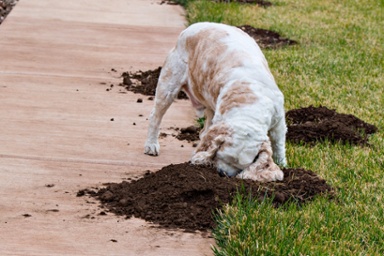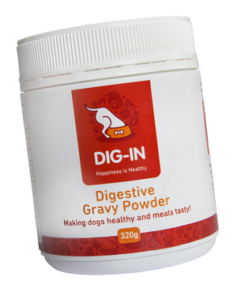Worms are almost an inevitable part of dog life, but it’s important to know the types of worms your dog may become infected with, and to be aware of the potential symptoms of infestation. Your dog can become host to a number of unwelcome internal parasites throughout their life. In Australia, the most common intestinal worms for dogs include hookworm, roundworm, whipworm and tapeworm[1].

Dogs can become infected with worms in many ways including drinking contaminated water, eating parasite-laden meat, or coming in contact with an infected animals or their faeces. While the symptoms of dog worms vary depending on the type of worm, in general infected dogs will appear run down, and may display symptoms such as:
- Weakness or lethargy
- Diarrhoea or vomiting
- Weight loss (despite having a robust appetite)
- An abnormally swollen belly
Aside from these broad symptoms of infestation, there are more specific indicators which can suggest the presence of certain types of worms:
- One of the most dangerous of all intestinal parasites, hookworms are picked up from the environment and passed through the faeces of infected dogs. Feeding on the blood and fluid which is released when they cut into the intestinal lining, hookworms commonly lead to bloody diarrhoea in infected dogs. The presence of hookworms may also be detected by extreme lethargy, if your dog suddenly develops a poor appetite, or if you notice blood in their faeces.
- Usually spread in faeces or passed to puppies during pregnancy or nursing, roundworms can cause serious infections. Roundworm infestations may cause diarrhoea, vomiting, weight loss, and a tell-tale ‘pot belly’ appearance (especially in puppies).
- Living in the small intestine, tapeworms can cause irritation around a dog’s bottom, causing them to ‘scoot’ along the ground. There are no obvious symptoms of tapeworms, but small, rice-like segments may be found in your dog’s faeces. Mature tapeworms can cause infected dogs to eat much more than usual, but without a corresponding gain in weight. In comparison to other parasites, tapeworms, while they still need to be treated, pose the least danger to your dog.
- One of the most common causes of diarrhoea in adult dogs, whipworm eggs can be picked up from the soil or infected faeces, and ultimately cause chronic bowel inflammation. You may notice mucus in your dog’s faeces, sudden weight loss or diarrhoea (sometimes containing blood). This parasite is more likely to occur where multiple dogs live together and have access to faecal material.
For the ongoing health and happiness of your furry friend, it’s important to follow a preventative worming program. Aside from consulting your vet to determine a regular treatment program for your dog, if you notice any potential symptoms of infections, take your dog to the vet as soon as possible. Your vet will be able to assess whether an infection is actually present and determine an appropriate course of treatment.
In addition to your dog’s preventative worming treatment program, the regular addition of Dig-In Digestive Gravy Powder to your dog’s daily meal also helps to support their ongoing health. Your dog will love the taste, while you’ll love that our all-natural gravy powder provides your dog with essential nutrients, helps to boost their immune system and increases the growth of healthy bacteria.
[1] Dogs can also be infected by heartworm (a non-intestinal worm) with the risk of infection reduced through the use of preventative medication. Consult with your vet to determine an appropriate treatment plan for your dog.






